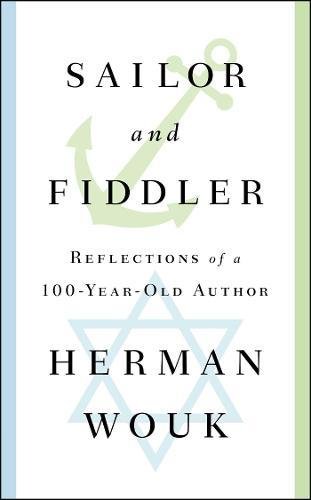
Sailor and Fiddler
Reflections of a 100-Year-Old Author
کتاب های مرتبط
- اطلاعات
- نقد و بررسی
- دیدگاه کاربران
نقد و بررسی

Starred review from February 1, 2016
At 100 years old, bestselling novelist Wouk remains a thriving, vital writer. In this slim memoir, what comes through is the sense of purpose and faith that has animated his writing, and in particular, his great historical novels, The Winds of War and War and Remembrance. He describes the creation of these testaments to WWII and the Holocaust as his "main task" in life. But this journey down memory lane is hardly somberâserious subjects are typically leavened by Wouk's keen sense of humor. (He credits Mark Twain's sense of "warm laughing life" with inspiring him to be a writer.) The narrative is episodic, but even this loosely organized book reveals the hand of a master storyteller. It emphasizes two aspects of Wouk's identity: "the sailor" (a reference to his WWII Navy service), a dedicated professional, and "the fiddler" (a nod to the musical), a Jewish man of faith. Wouk ends with the tantalizing thought of his diary one day being published by his sons; it contains, he says "the whole Herman Wouk story." For now, it is enough to have this small love letter to his readers, whom he thanks "for the chance to please... through my books." Indeed he has, and, to our great good fortune, continues to do so.

December 15, 2015
Gently meandering work about writing and remembrance by a beloved American sage and author. A kind of tongue-in-cheek anti-autobiography, this slender memoir by Wouk (The Lawgiver, 2012, etc.) divides his writing life and influences since he was 12 years old in 1927 ("the year 'Lucky' Lindbergh flew over the ocean nonstop to Paris") between "Sailor," or how his itinerant real life insinuated itself in his work, and "Fiddler," the spiritual journey of his later years, as he plunged into Judaism and the saga of Israel. His longtime wife and literary agent (since deceased) used to read everything that he wrote and pounced on his idea of writing his autobiography by reminding him skeptically, "you're not that interesting a person." Wouk's roots as a comedy writer pop up throughout the book. Having grown up in a Bronx Jewish household to Yiddish-speaking parents--his steam-laundry boss Papa regaled the family Friday nights with his readings of Shalom Aleichem--Wouk was steeped early on in folk humor and resolved to be a gagman, hired by "gag czar" David Freedman and then Fred Allen. By 1943, he was scrawling the first page of his first novel, Aurora Dawn (1947), aboard a minesweeper and became a rather accidental novelist, or so he writes about his advance for The Caine Mutiny (1951)--he was "bemused by this windfall of bucks." Indeed, the author can barely grasp the effort that certainly charged his monumental works of fiction, starting with "the first novel about American Jewry," Marjorie Morningstar, which put him on the cover of Time. Wouk was first moved to write about the Holocaust by reading Raul Hilberg; from there, he plunged into the "main task," aka the World War II books. His "Fiddler" years led him to the autobiographical Inside, Outside (1985) and to years of intensive military research for The Hope (1993) and The Glory (1994)--"it's expected of you," he was told. Readers of Wouk will delight in accompanying him through his triumphs and grief.
COPYRIGHT(2015) Kirkus Reviews, ALL RIGHTS RESERVED.

February 1, 2016
Readers of a certain age will remember Wouk for his blockbuster novels that became movies or television miniseries, including the Pulitzer Prize winner The Caine Mutiny, as well as Marjorie Morningstar, and popular war novels The Winds of War and War and Remembrance. Now the acclaimed author has penned a memoir to coincide with his 100th birthday. With an amusing clarity, Wouk recollects his early days writing comedy for the Fred Allen radio show as well as his experiences in the navy that led him to write The Caine Mutiny. As a Jew living through World War II, the author brought a distinct perspective to his war books, even though he found the seven-year project a difficult one. A humble man, Wouk gives plenty of kudos to his wife who served as his agent and able critic, pointing to her invaluable advice over 66 years of marriage. VERDICT This small volume will delight Wouk's fans along with readers interested in the professional and spiritual growth of a prominent American writer whose insights span two centuries.--Nancy R. Ives, SUNY at Geneseo
Copyright 2016 Library Journal, LLC Used with permission.

























دیدگاه کاربران